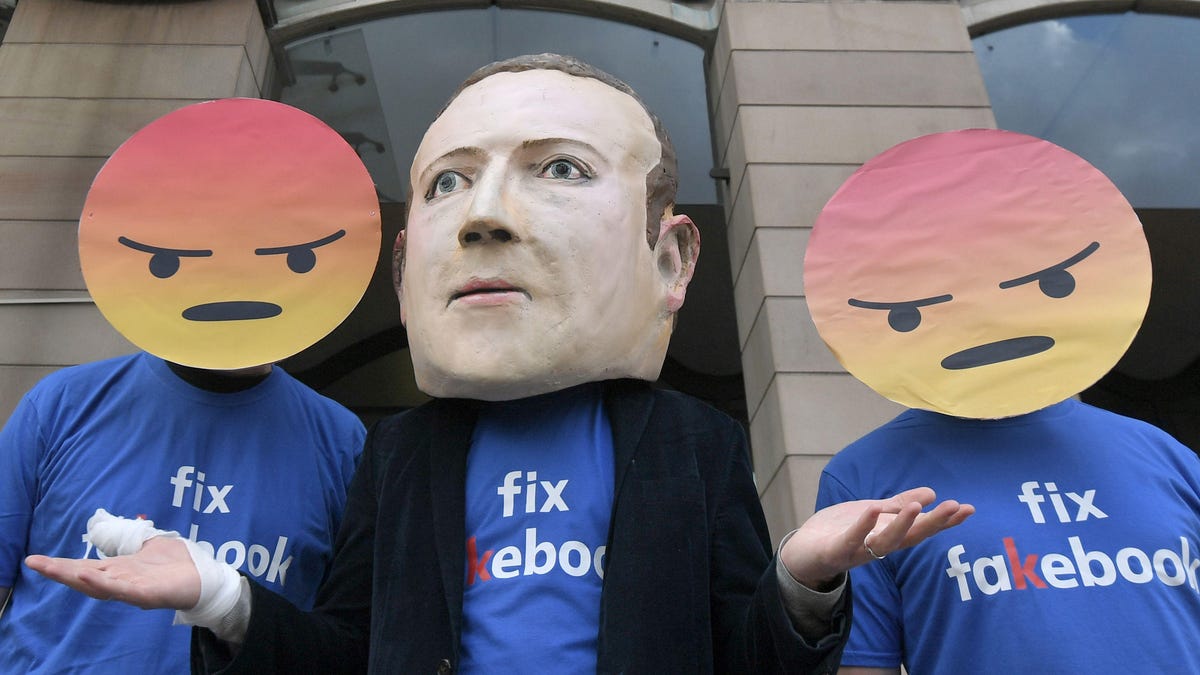Facebook branded a 'morality-free zone' in UK inquiry
Mark Zuckerberg sent Chief Technology Officer Mike Schroepfer to Parliament to face tough questions about Cambridge Analytica, dark ads and fake news.

A top Facebook exec on Thursday faced a grilling from the British government over the Cambridge Analytica data-mining scandal and the impact of fake news on the Brexit referendum.
Facebook Chief Technology Officer Mike Schroepfer sat before the UK government inquiry in place of CEO Mark Zuckerberg, who two weeks ago testified to the US Congress but snubbed an invitation to speak before Parliament's Digital, Culture, Media and Sport Committee.
Outside the inquiry in Westminster, protestors wore Zuckerberg masks and T-shirts reading "Fix Fakebook." Inside, committee Chairman Damian Collins and other Parliament members held Schroepfer's feet to the fire about the company's recent scandals. Several questions focused on Cambridge Analytica, which used Facebook users' data to allegedly influence the Brexit referendum -- in which the UK voted to leave the European Union -- and the US presidential election in 2016.
Pressed on how many British Facebook users were exposed to political campaigning backed by foreign money, Schroepfer said he didn't have figures with him. It was one of many questions he deflected with promises to provide more information following the session.
MP Julian Knight accused Facebook of potentially impeding lawful investigation and called for an apology for bullying journalists with legal threats.
"I put it to you that Facebook is a morality-free zone," Knight said. "You aren't an innocent party maligned by the likes of Cambridge Analytica. You are the problem."
'That was a mistake'
Earlier this week, the committee grilled another key player in the scandal, Aleksandr Kogan, who harvested data of tens of millions of Facebook users via an app and then moved the data to Cambridge Analytica through his company GSR. Kogan co-founded GSR with Joseph Chancellor, who now works for Facebook. Schroepfer said that Facebook was not aware of that relationship when it hired Chancellor. Schroepfer was unsure of Chancellor's role within Facebook, but did say that Chancellor is currently the subject of an internal investigation.
Schroepfer acknowledged that at the time Kogan's app was mining the data of Facebook users, the social network didn't read the terms and conditions of such third-party apps. Instead of discovering the possible data breach through its own internal safeguards, Facebook learned about the issue from reports in the Guardian newspaper in 2015.
Upon learning of the misuse of user data, Facebook didn't contact the UK's information commissioner and didn't inform users until this year.
"In retrospect that was a mistake," Schroepfer said.
Referring to the ways Facebook's platform has been manipulated, he later added, "We didn't fully understand the threat."
The committee also questioned Schroepfer about fake accounts, voter-suppressing "dark advertising" and interference in Western democracy by groups such as the Russia-backed Internet Research Agency. Collins said that Facebook is the "pipe through which fake news comes, and there doesn't seem to be much you can do to control it." But Schroepfer repeatedly said that the best way to fight fake news is to identify and ban bad guys rather than adjust the way political advertisements are shown in people's news feeds.
He insisted that ads appearing in news feeds provide the best customer experience because users can just scroll past the ones they don't like, just as they might scroll past a friend's third cat video of the day.
The Facebook exec described political advertising as a "powerful tool for free speech" that Facebook would be reluctant to curtail. However, he also highlighted Facebook's decision to ban cryptocurrency advertising over concerns about dodgy ads.
The UK inquiry into fake news began before the current Cambridge Analytica scandal emerged in mid-March. Facebook's UK policy director, Simon Milner, and its head of product policy, Monika Bicker, answered questions in February, but MPs have repeatedly urged Zuckerberg himself to step up. While Thursday's inquiry was in session, it was announced that Zuckerberg is likely to agree to face the European Parliament.
MP Ian Lucas accused Facebook of concealing information during the February questioning and asked Zuckerberg to also speak before the British committee. He asked Schroepfer where the buck stops, and Schroepfer replied, "It stops with Mark."
Cambridge Analytica: Everything you need to know about Facebook's data mining scandal.
iHate: CNET looks at how intolerance is taking over the internet.

